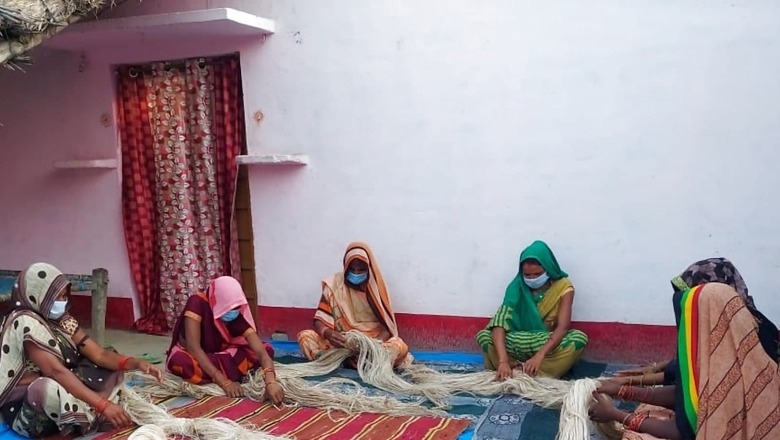
views
From the four walls of her house to a successful entrepreneur producing banana fibre, Sunita and her Self Help Group is receiving recognition not just in the district and state, but also across the country and abroad. It is a moment for them to ‘Go Bananas’ with joy as Prime Minister Narendra Modi himself appreciated their efforts to make the best out of waste.
“During COVID times, there has been a unique initiative in Lakhimpur Kheri. Here work has started to impart training to women to make fibre from the discarded banana stems, an attempt to achieve best from waste. Banana fibre is made by cutting the stem of a banana with the help of a machine, which is like jute or flax. Handbags, mats, rugs, many things are made from this fibre. Due to this initiative, on one hand, the use of crop waste started, while on the other hand, the sisters and daughters living in the village got another source of income,” said PM Modi said during Mann Ki Baat on Sunday.
Like any other village woman, Sunita of Samaisa village in Lakhimpur too could not think beyond the four walls of her house until she became a member of the ‘Ma Saraswati’ self-help group. During Covid, her husband was finding it hard to feed their kids. Now, the self-reliant women of Uttar Pradesh are scripting their own success.
An initiative of the UP government and Lakhimpur Kheri administration to make rural women financially independent by training them to extract fibre from discarded banana stems. Banana fibres are largely used in textiles, slopes and diapers. The project was kicked off last December in Samaisa village of Isanagar Block.
“It is a great feeling to earn more than four hundred to six hundred rupees a day. Now, I am able to support my entire family,” said Sunita smilingly. Like her, other women of the village earn on an average Rs 400 a day through this enterprise.
Chief Development Officer of Lakhimpur Arvind Singh said the initiative is a step towards “One Block One Product”, taking inspiration from ‘One District One Product’. Banana cultivation is done on a large scale in Isanagar. When the bananas are harvested, the farmers usually throw away the banana stem. The discarded stem has become a source of employment for rural women who draw fibres from them. “We contacted the farmers and they gladly agreed to give the stem of the banana. Discussions were held with the women of the Self Help Groups in several phases. We selected 25-30 women for the Self Help Groups and then they were given the training.”
Singh added that the main challenge was to “mobilise machinery” for production. “Therefore, the self-help group was given a loan from CLF and after talking to various vendors the machines were ordered from Riddhi Enterprises Surat, Gujarat in November 2020.”
The production started in December 2020, but now the challenge was to find the market. Since Banana fibre is being used mostly in the paper and textile industries. Therefore, contacts were made for sales in Surat, Ahmedabad and Kanpur.
A company in Gujarat that transforms agricultural waste into natural fibres gave a contract to procure 400 kg of banana yarn per month extracted by the SHG. The product will be delivered from August 2021.
Various companies of India Mart have demanded the yarn from the village organisation on a large scale (about 10 tonnes). Banana fibre is being demanded commercially in large quantities. Therefore, the GST registration of the SHG is also being done.
Banana fibre is being sold at the rate of about Rs 150 to Rs 200 per kg and a profit of about 50% is being received at this price.
Encouraged by this, women from other self-groups of the region are being linked to this drive and preparations are being made to source additional machinery from Gujarat.
Read all the Latest News, Breaking News and Coronavirus News here.



















Comments
0 comment